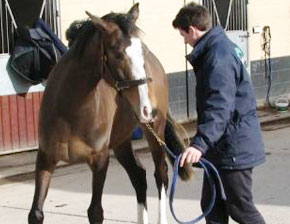Our brain and spinal column are the control center of our body. If these become damaged or altered, it can affect us in a variety of ways. With modern technology, our understanding of these effects is never-ending...
Neurological Diseases In Horses
Neurological diseases in horses have been a great matter of concern in the horse industry. Since the health of horses is of the primary concern, neurological diseases have been given special attention and more knowledge about how to prevent them has always been a challenge to horse owners. Following are some of the neurological diseases in horses and the ways in which they can be prevented:
Swamp Fever or EIA- Infectious Anemia:
- This is an example of viral neurological diseases in horses that affects horses despite all the statewide testing.
- The common symptoms of this disease include subcutaneous edema, weight loss, anemia and intermittent fever.
- Prevention of EIA can be done by:
- Avoiding sharing of needles while administering vaccinations
- Drug injections
- Monitoring of horses during their congregation in sales barns, sporting events, etc.
- Vaccination is not really possible considering the variety of viruses that exist in the populations and because of the lack of proper means to test the disease considering the wide varieties of viruses that affect the horse population and because of the lack of proper testing facilities available for diagnosis.
Sleeping Sickness or Encephalomyelitis:
- Sleeping sickness is one of the common neurological diseases in horses and it occurs due to the transmission of viruses from insects belonging to the family called Togaviridae. The virus affects even humans and birds apart from horses.
- The disease causes the inflammation of the spinal cord and the brain.
- The earliest symptoms of encephalomyelitis include stiffness, anorexia and nonspecific fever and these start showing up within five days from the contraction of the virus. As the disease takes its course, more symptoms like chewing difficulties, aggression, hyperesthesia or increased sensation in the skin, disorientation, sleepiness and depression occur.
- There is no treatment known yet for encephalitis and intervention is provided to reduce the severity of symptoms so as to protect the infected horses from self-injury during seizures and supportive care is essential. Grooming can be done to reduce the formation of ulcers and skil scalding.
Prevention of encephalitis has its basis on reducing the vectors of infection and any kind of intermediate hosts. Also, vaccination is possible to control the chances of horses catching the infection.
Rabies:
- The diagnosis of this neurological disease becomes very difficult because of the wide variety in the neurological symptoms that it produces.
- The common symptoms include:
- Biting viciously
- Rolling
- Extreme agitation
- Nervousness
- Anorexia
- Hyper-excitability
- Irritability
- Once the symptoms start appearing, the horse infected dies in 2-5 days in most of the cases.
- Rabies can be prevented with vaccination although there has been no proof of its effectiveness.
- The important fact to keep in mind here that unless a horse is diagnosed with another neurological condition, his symptoms can always be attributed to rabies.
Conclusion:
Neurological diseases in horses can be of great frustration to horse-owners as it may have an adverse effect on the horse. However, with vaccination, owners have a chance to protect their horses from many neurological conditions.

- Home
- Acupuncture Therapy For Neurological Diseases
- Chronic Neurological Diseases
- Common Neurological Diseases
- Degenerative Neurological Diseases
- Equine Neurological Diseases
- Fatal Neurological Diseases
- Genetic Neurological Diseases
- Hereditary Neurological Diseases
- List Of Neurological Diseases
- Most Common Neurological Diseases
- Neuro-Infectious Diseases
- Neurological Autoimmune Diseases
- Neurological Degenerative Diseases
- Neurological Diseases In Children
- Neurological Diseases In Dogs
- Neurological Diseases In Horses
- Neurological Disorders Brain Diseases
- Neurological Genetic Diseases
- Neurological Symptoms
- Neurological System Disorders
- Pediatric Neurological Diseases
- Rare Neurological Diseases
- Symptoms Of Neurological Diseases
- Treatment Of Neurological Diseases
- Types Of Neurological Diseases
